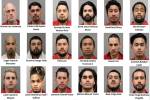Offender status law blocked
More than 2,000 sex offenders in Clark County got a break Thursday after a district judge temporarily stopped a new law from taking effect.
District Judge David Wall granted a preliminary injunction preventing authorities in Clark County from enforcing Assembly Bill 579, the new law that categorizes sex offenders by the crime for which they were convicted instead of their risk of re-offending.
Wall granted the injunction until Aug. 29, when he will hear arguments on the constitutionality of the new law.
The law, commonly known as the Adam Walsh Act, was set to take effect on Tuesday.
"We're pleased the injunction has been entered, so my clients' status remains unchanged as we challenge" the law, said Richard Schonfeld, an attorney who brought the case in District Court on behalf of two sex offenders.
The sex offenders who challenged the law, identified only as D.P. and W.L., argue it's unconstitutional. They contend it re-punishes them for crimes they already have paid for and restricts their movement.
D.P. was convicted of gross sexual imposition in Ohio in 1993. W.L. was convicted of lewdness with a minor in 1994. Both are categorized as Tier 1 sex offenders in Nevada but would be reclassified as Tier 3 sex offenders under the new law.
Wall's order prevents the Nevada attorney general's office and the Nevada Department of Safety from enforcing AB579 in Clark County. The order applies to D.P., W.L. and "all those similarly situated" in Clark County, according to a copy of the signed order.
"We'll continue to defend the constitutionality of the law," said Christine Guerci, chief deputy attorney general.
The new law would increase the number of Tier 3 sex offenders to more than 2,400 in Clark County, up from a little more than 100. Tier 3 sex offenders have been convicted of the most serious offenses, including sexual assault and sexual abuse of children under 13.
The law requires the new Tier 3 sex offenders to register with authorities every 90 days, submit to fingerprinting and, in some cases, wear GPS monitoring devices.
Their personal information, including their photos, will be posted on the state's sex offender Web sites.
The American Civil Liberties Union of Nevada with attorney Robert Langford filed a similar challenge to AB579 in federal court and asked for a temporary halt to the law statewide.
Langford said AB579 makes monitoring sex offenders harder for authorities because it spreads resources too thin.
"It's certainly not the responsible way to handle sex offenders in this state," he said.
U.S. District Judge James Mahan is scheduled to hear the case Monday.
The Legislature passed the bill in 2007 to get Nevada in line with the federal Adam Walsh Act, signed by President Bush in 2006. The intent is to push all states to categorize sex offenders the same way.
Supporters of AB579 and the federal legislation contend sex offenders will have a harder time evading detection nationwide once all states are on board.
They also argue the public has a right to know whether sex offenders are living in their communities.
Activist Donna Coleman, a supporter of AB579 who has been involved in sex offender issues in Nevada, said the law will prevail.
Wall's order Thursday is "just going to give sex offenders two more months of anonymity until their neighbors know who they are," she said.
She defended the law and said that people need to know who the new offenders listed as Tier 3 are.
"This isn't a lottery. We're not picking names out of a hat," she said. "These people have done something really heinous."
But opponents of the law contend it does not protect the public.
Maggie McLetchie, staff attorney for the ACLU of Nevada, said she hopes the attorney general's office will hold off implementing the law statewide while the constitutional arguments are heard.
Contact reporter David Kihara at dkihara@reviewjournal.com or 702-380-1039.























